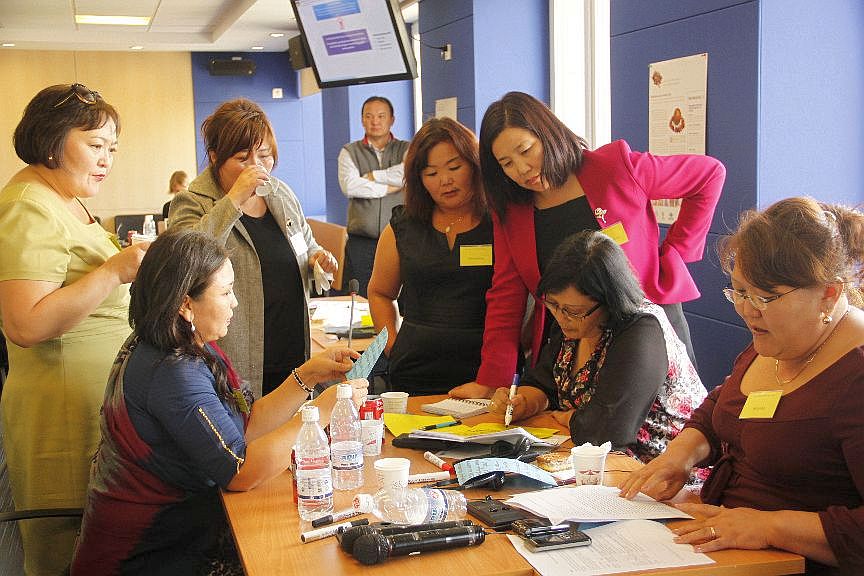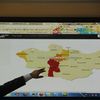ULAANBAATAR, MONGOLIA – In preparation for the full implementation of the Public Procurement Law of Mongolia scheduled on October 1, 2012, the newly-formed Partnership for Public Procurement (National Network) of Mongolia held a strategic planning workshop on September 17-19, 2012 in the capital city of Ulaanbaatar.
Led by Norovjav Otgonjargal of the Procurement Development Center and Gavaa Tsetsgee of Procurement CSO Network, the workshop participants included citizen volunteers from Ulaanbaatar and participating aimags (provinces).
The workshop was supported by the World Bank represented by Zahid Hasnain, Senior Public Sector Specialist based in Mongolia, and Kathrin Frauscher, who manages the World Bank Institute’s Contract Monitoring Initiative, which promotes transparency in procurement processes and outcomes in key industries, such as extractive industries, construction, health, and education using multi-stakeholder coalitions.
The Partnership for Public Procurement (National Network) of Mongolia is an independent, self-regulated and voluntary partnership of civil society organizations established to strengthen social accountability and good governance in public procurement through citizen participation in and oversight of public procurement. The Network aims to engage government in a constructive manner guided by the principles of public procurement as established by law, i.e. transparency, fairness, competitiveness, effectiveness, efficiency and accountability of public procurement.
The three-day workshop was conducted to allow the participants to articulate and clarify their collective theory of change on which would be based their five-year results framework. It was cofacilitated by Adelfo V. Briones and Ma. Kristina Marie L. Aquino of the Manila-based Affiliated Network for Social Accountability in East Asia and the Pacific (ANSA-EAP).
At the end of the workshop, the participants were able to determine that they will contribute to an “improved public procurement [i.e. transparent, competitive, efficient, effective, and accountable] with citizen participation and oversight”. Within five years, the partnership would like “to establish an independent, capable and nationally-recognized organization specializing in public procurement”. To achieve this, the participants saw the need to have the following:
- A shared procurement monitoring framework
- A coordinated network of citizen monitors at local and national levels
- Established partnerships with government and non-government stakeholders
- A database of information relevant to procurement monitoring
- Implemented sets of recommendations, responses, and feedback of network members
To jumpstart the implementation of the network’s strategic plan, the participants crafted a 100-Day Action Plan on the third day. The action plan focused on enhancing citizen engagement and eventual participation in and oversight of public procurement activities in Ulaanbaatar, specifically on monitoring ongoing road construction and repairs in District X. This activity will serve as the Network’s pilot project in coming up with a model of constructive engagement and citizen monitoring in procurement and contract monitoring.
In addition, the workshop became the venue for the participants to discuss and finalize a set of recommendations to the Ministry of Finance on the Implementing Rules and Regulations (IRR) of the Public Procurement Law of Mongolia. One of the last activities in the workshop was a dialogue between CSOs—represented by the participants—and officials of the Ministry of Finance to discuss the proposed set of IRR as well as urgent issues and concerns.
While appreciative of the accomplishments of the workshop, the participants, as well as the partner organizations such as the WB and ANSA-EAP, recognized that the partnership continues to be confronted with many challenges and issues. Among these are scanning for and linking with possible resource opportunities for sustainability purposes, drafting a capacity building plan, strengthening the partnership’s organizational structure, mapping of potential partners and stakeholders, setting up a coordination structure among local partners, formalizing partnerships with government and other partners, generation and development of templates and tools, generating indicators for internal monitoring and evaluation, and the documentation of the procurement reform.
But given the development opportunities in Mongolia, the participants were one in saying that they are willing to step up and take on the challenges by presenting their work as a model of how social accountability is done in the real world.





